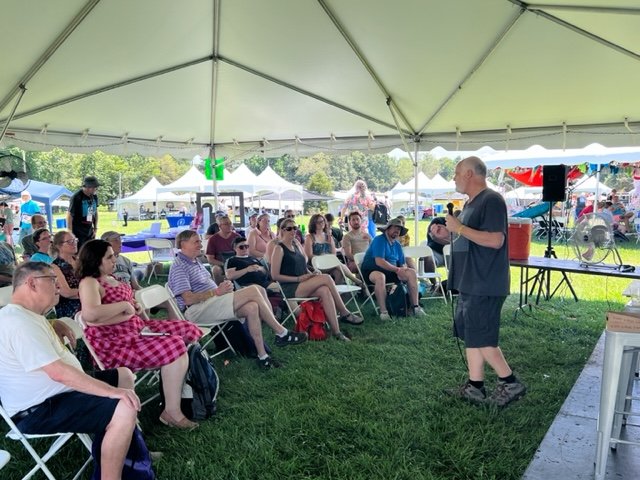Geese Gather to Fight Climate Change
Meanwhile the wild geese, high in the clean blue air,
are heading home again.
Whoever you are, no matter how lonely,
the world offers itself to your imagination,
calls to you like the wild geese, harsh and exciting —
over and over announcing your place
in the family of things.
—Wild Geese, by Mary Oliver
The month of July couldn’t have provided a better set-up. Temperatures in the southwest US were setting records for both highs and lows. People were getting second- and third-degree burns by merely falling on the sidewalk. Ocean temps off the coast of Florida were topping 100 degrees. Montpelier, Vermont, normally considered a safe haven from climate change, was under three feet of floodwater. Spain was experiencing surface temperatures approaching 140 degrees. Tourists were evacuating 5-star resorts on burning Greek islands. And most of the northeastern portion of the US was choking on smoke from Canadian forest fires. The month of July would later be declared the planet’s hottest month in hundreds if not thousands of years.
In the midst of this chaos, I headed to the Wild Goose Festival, a progressive issues and deconstruction gathering named after the Mary Oliver poem and held near Charlotte, NC. The festival has become a home for the quirky, the marginalized, and the just plain rejected by the church. Many of the attendees have transitioned out of evangelicalism and/or fundamentalism but are working to create a more loving, inclusive, and sustainable faith. This was my third “Goose.”
Many WIld Goose favorites were back as featured speakers, including Diana Butler Bass and Brian McLaren. I was pleased to see that this year’s festival was leaning in hard on climate change. Besides my own presentation on “Ending Church Silence on Climate Change” they also invited Bill McKibben to be one of the featured presenters. If you don’t know about Bill, I consider him to be the Neil deGrasse Tyson of climate change—often interviewed by the media and a clear communicator of climate science to lay readers. Bill played a big part in my own climate awakening.
Doing my thing
After my presentation in a sweltering tent, I met so many wonderful folks who are passionately working for the planet. They came from all sorts of different denominations—Methodist, Presbyterian, Episcopalian, United Church of Christ—all dedicated to their work but also feeling like small, isolated portions of their own faith traditions. A highlight for me was meeting a young person eager to make a bigger difference. Sam, I hope you left encouraged and motivated for the work ahead.
Listening to Brian McLaren and Bill McKibben present together was both illuminating and a bit grim. They’ve both been at this a while and they see the clock ticking down. Here were some takeaways:
McLaren remarked on the injustice of climate change. Basically, the less you have done to cause the crisis, the faster you are impacted. Africa, responsible for 2 percent of carbon in the atmosphere, is now facing widespread famine. After three years without a rainy season, more than 23 million people across parts of Ethiopia, Kenya, and Somalia are facing severe hunger.
Brian also referenced the fact that we are already locked into a certain amount of warming and biodiversity loss but there is still time to change this. At this point, we must ask ourselves how much we want to lose. We must now work to save what we can.
Bill McKibben remarked that the opposite of hope is not despair but cynicism. Despair is a natural feeling based on love and empathy. Cynicism is choosing not to care or act.
Bill remarked that our planet has a fever and we are the antibodies.
They referenced Jim Wallis, who once said, “The environment is not one issue against a bunch of other issues. It is an issue that will make every other issue worse.”
Both speakers reflected on decades of witnessing changes in many mainstream faith traditions. Congregations they grew up in eventually chose biblical literalism over science, fear and xenophobia over love and compassion. As McKibben remarked, “The Bible is too important to be taken literally; it needs to be taken seriously.”
These things may sound foreboding. They should. We are facing a potential extinction-level event that will only accelerate in pace. But they also say these things because they want us to feel the urgency of our dilemma. We have six and a half years to cut our planet’s emissions in half. That can sound hopeless, but I choose to see the hope. We HAVE six and a half years to act. Future generations will not have that. We do. Climate change is THE defining moment for those of us who are alive right now. There is nothing more important. Bill and Brian are speaking prophetically to a U.S. church that is largely ignoring the issue, pleading with it to care about our dying creation and to take action.
The highlight of the weekend happened for me in the final half-hour. I met Brian McLaren and told him how much his books and words have been for me. Brian and Richard Rohr have been instrumental in helping me to find a faith that works. They opened the door to a more contemplative and heart-centered faith that got me through some rough times of loss during the pandemic. A faith that allows me to see the presence of God in all people and in all of creation. Brian was so gracious and actually invited me to dinner with some others from Rohr’s Center for Action and Contemplation. What a wonderful evening to cap this experience.
Tom and Brian McLaren
The Wild Goose Festival is being filed under Good News because it attracted so many amazing people of faith who see what is going on and are giving their lives to make things better. It was good for me to see this and for every person in attendance to see it as well. I hope to stay in touch with them. I want to tell their stories of climate change work. (Please send them to me at efaith.quest@gmail.com!) If anyone should know what it is to be the scrappy underdog, it is the church. In Star Wars parlance, we are always more effective as a rebel force than as the empire, or as Bill McKibben put it: “Church is better off being the counter-culture than being the culture.”
Amen, brother.




